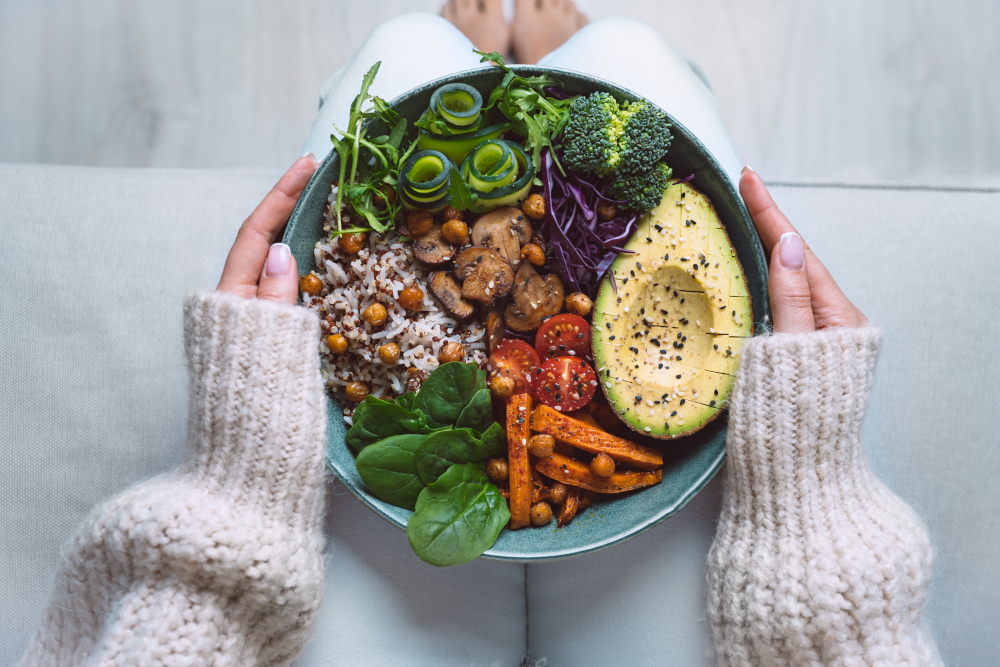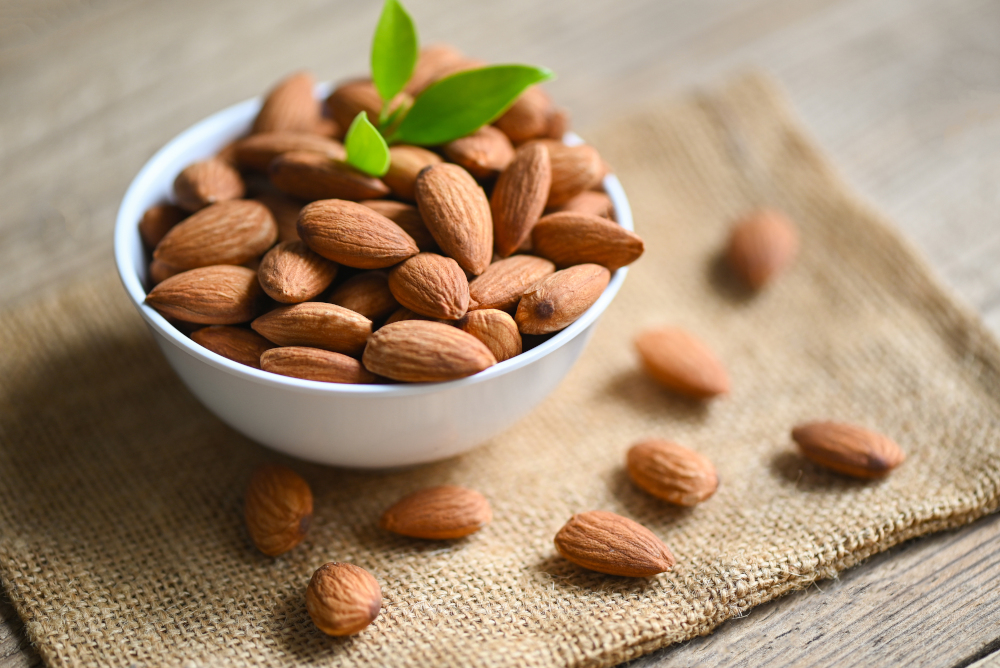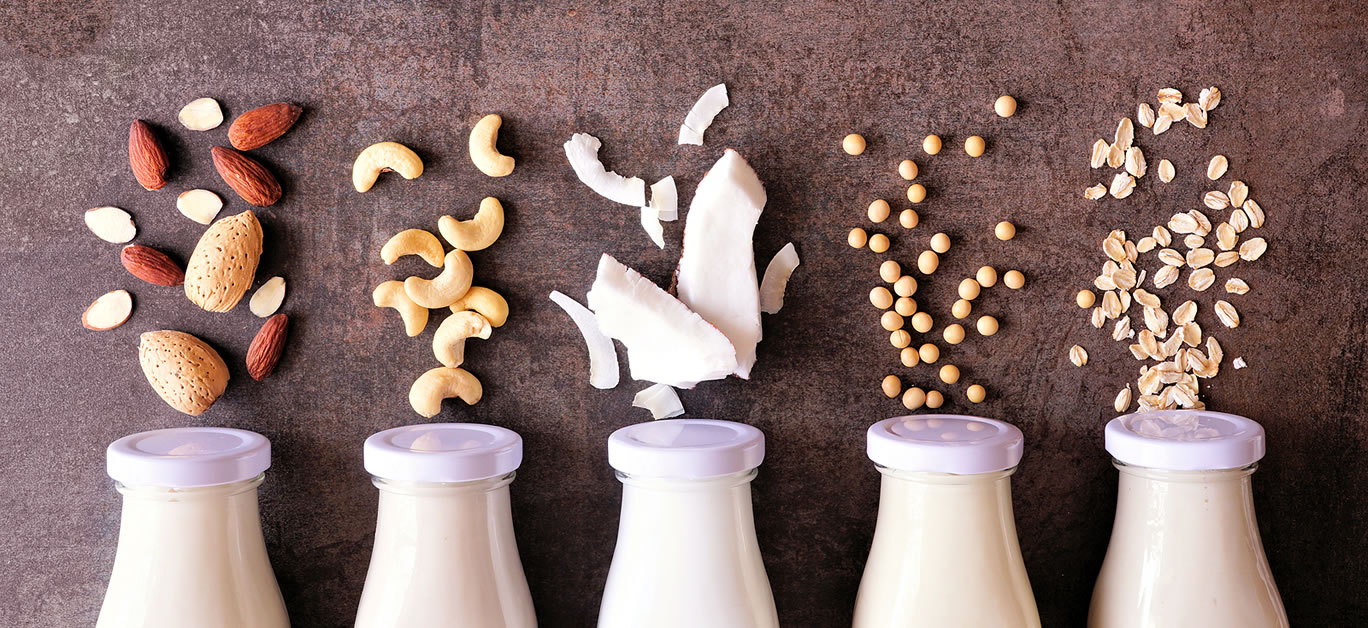Once upon a time, plant-based diets were relatively unheard of, but over recent years they’ve been enjoying a dramatic surge in popularity as more people seek to improve their health, make better choices for the environment and generally be more conscious when it comes to what they are putting into their bodies, and why.
While just ten years ago it would have been a difficult process for anyone transitioning to veganism thanks to the severely limited options available to them, the ever-growing market of plant-based alternatives, which has managed to replicate many of our favourite meat and dairy-based foods to offer greater choice, has made it relatively easy for those keen to eradicate animal products, whether partially, or fully.
Nevertheless, vegan doesn’t necessarily mean healthy, and today, the supermarket shelves are packed with processed products ranging from ‘fakon’ (plant-based bacon) and ‘chick’n’ (a meat-free chicken alternative) to all manner of dairy free desserts and treats that won’t necessarily help you to achieve your health goals and could in some ways, be detrimental to them.
Done right, following a plant-based diet can come with many benefits, and by centring your meals and snacks around whole foods, you can ensure you’re still getting the vital nutrients your body needs to function and to keep you feeling your best. In some cases, supplementation is also advisable to support your nutrition, but when you consider that a plant-based diet can help to reduce body weight and lower LDL cholesterol, for many, the pay-off is worth it.

If you’ve been considering moving to a plant-based diet in 2023, then it’s wise to get as clued up about it as you can before taking the plunge. Here, we take a look at all you need to know about plant-based diets, from the benefits to how to get started.
What is a plant-based diet?
A plant-based diet is a dietary pattern that is mostly made up of foods that are produced from plants. These include fruits, vegetables, legumes, and whole grains, which are high in fibre, antioxidants, and vitamins and low in cholesterol and fat, often containing fewer calories than animal products.
There are many benefits of a plant-based diet, including a lower risk of certain cancers and heart disease – plus, making the change will also support a wider reduction in greenhouse gas emissions. Animal agriculture accounts for 16.5 per cent of global greenhouse gas emissions, and getting the numbers down is key to the longevity of our planet and for minimising climate change – so in many ways, going plant-based is a win-win.
Health benefits of a plant-based diet
So, what exactly are the health benefits you can expect when following a plant-based diet?
Lower risk of heart disease
Plants are packed with a host of nutrients and antioxidants that support the body’s immune system, and help to keep cells healthy and in balance. Eating more of them is associated with lower instances of heart disease and other related conditions, and a number of studies have linked a vegan diet to better cholesterol levels, less inflammation, and a lower risk of heart failure.

Weight management
A plant-based diet is a great way to shed pounds and improve your overall health. Specifically, it promotes good weight management, and can help to reduce fat, as well as improving insulin sensitivity – but it’s important to note that even when eating primarily plants, calories still count, and processed animal product alternatives can often be high in calories as well as being packed with preservatives, so are best kept to a minimum.
This type of diet can be particularly helpful for overweight people with joint issues, as well as patients with cardiovascular disease. For more advice on plant-based diet and weight loss, check out Health Insider.
Diabetes prevention and treatment
There is an increasing number of studies suggesting that a plant-based diet may help prevent and treat diabetes. Fruits and vegetables can, when eaten in the right combinations and at the right times, help to improve insulin sensitivity and have a lower glycaemic index, as well as being high in fibre. And because a plant-based diet can also help adopters to reduce their weight, which is one of the major risk factors for developing type two diabetes, it can also minimise your chances of doing so.
Foods to eat for a plant-based diet
Fruit
One of the best foods you can possibly include in a plant-based diet is fruit, and in as wide a variety of types and colours as possible, as all fruits are packed with nutrients, antioxidants, and phytochemicals to support optimal health.
Antioxidants are important because they protect cells and help to mop up the damaging free radicals that are present in the body as a result of pollution, chemical exposure and other day-to-day environmental stressors. It’s important to eat fruits regularly to benefit your body, and boosting your intake can help reduce your risk of cancer, heart disease, and inflammation. Opt for organic where possible, as standard fruits and vegetables are often sprayed with pesticides, which can be harmful to the body.

Plant-based milk
Plant-based milk is a delicious inclusion in any plant-based diet and can be used in any recipe to replace dairy, as well as in hot drinks like tea and coffee. However, it’s worth bearing in mind that not all plant products are created equal, so in order to make the best possible choices, read the labels.
A variety of plant-based milks are available these days, ranging from almond and cashew to oat and coconut. Each is unique in its nutritional content and uses, which is why understanding them and what they contribute to your body’s daily needs is key. For optimal nutrition, choose unsweetened versions.
Vegetables
Vegetables often form the foundation of a plant-based diet because, as well as providing the body with numerous important nutrients to support its essential processes, they are low in sugar and often contain less calories than many fruits, whilst still packing a punch when it comes to fibre. Eating at least five portions of fresh vegetables each day can help the body keep up with the demands it faces and help you to feel healthier and happier overall. Again, the wider the variety you include in your diet, the better, as each vegetable contains a different combination of nutrients to support optimal health.
Seeds
Seeds are often overlooked in the standard modern diet, but in fact, they offer many health benefits and are easy to integrate into your daily meals and snacks. One of the biggest challenges when going plant-based is ensuring you’re getting sufficient amount of protein, as animal products like meat, fish and dairy are typically our main sources – but seeds are actually a great source of it, as well as being full of essential minerals like zinc, magnesium, copper, and manganese.
Chia seeds are a particularly good choice, as they contain a good amount of protein, are high in fibre and can also help to boost your level of heart-healthy Omega three fats.

Nuts
Nuts are a handy way to get those essential Omega three fatty acids into your plant-based diet, which are important for supporting heart and brain health. They are also another good source of protein and complex carbohydrates, and contain many of the nutrients your body needs to stay healthy, including plant sterols, antioxidants, and fibre.
Legumes
Legumes are another great inclusion in any plant-based diet. Low in fat and packed with fibre protein, and minerals, a handful of legumes added to a meal is a great way to increase satiety, and they taste good in all kinds of dishes, ranging from salads to snacks, desserts, stews, and soups. Inexpensive, versatile, and nutritious, legumes are an excellent alternative to meat and will add texture and bite to your meals, and as an added bonus, they’re also good for your heart.
Whole grains
High-fibre wholegrains like rice and quinoa are filling foods that add bulk to a vegan diet and can help to boost feelings of satiety as a result, keeping you feeling fuller for longer. Low in fat and high in phytochemicals, vitamins, and minerals, add a portion to each meal to support your energy levels and overall vitality, as well as keeping your brain firing on all cylinders for optimal performance.






















